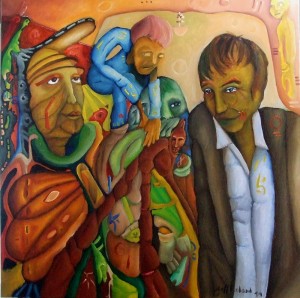I’m Social And You’re Not

One of the most troublesome incompatibilities that can exist in a love relationship occurs when one person is ‘social’ and the other is not. This means one person needs and seeks the company of other people, while with his or her partner, and when not together.
This social need might be met by hanging around with other couples and/or single individuals who are friendly with both persons in the love relationship. The partner who is not social would tend to be attracted to more solitary pursuits and prefer time together exclusively as a couple.
It’s hard to say one way of living in a love relationship is better than the other. The social types would say that bringing other people into a love life is enriching. They would say that it cuts down on the ‘suffocation’ you can feel if you’re an isolated couple.
The not so social types would emphasize the pluses to keeping other people at bay, like the depth of intimacy that’s possible during exclusive time together, and reducing the ‘drama’ and jealousies that can emerge when other people’s personal motivations are influencing a couple.
I think it’s reasonable to assume, it’s entirely possible (perhaps even necessary) to build a lifestyle that has elements of both, friendships and exclusive time together. I believe that the average person has multiple needs, some involving social relationships and what we ordinarily get from them, and some involving the depth of intimacy that is possible when two people in love form an exclusive bond.
Even though proponents of one or the other ‘love-style’ can easily illustrate the ways in which these two styles are at odds, it is possible for two people to help each other develop skills in areas that would not have ordinarily developed had the relationship not formed. In fact, one of the greatest potentials in a love relationship is for two people to grow together in different areas of their respective personalities.
For a person who tends toward introversion and exclusivity in relationship to discover the joys of friendship and close companionship with others, is a wonderful byproduct of being in love with someone different than oneself. This assumes of course that you’ve fallen in love with someone who loves to be around people and tries to introduce you to the pleasures of this activity during the course of the relationship.
The opposite is also possible when someone who tends to gravitate toward groups and multiple shared friendships while in a committed love relationship, develops his or her taste for an exclusive deeper involvement that spending one on one time together can provide a couple. Both of these transformations are possible in a love relationship where partners are aware of the areas of growth that are possible in each other.
You could say, without any argument from me, that helping each other in this way is an ‘act of love’ and a sure sign of growth and health in a love relationship.
Comments? Welcome. Dr. Tom Jordan
